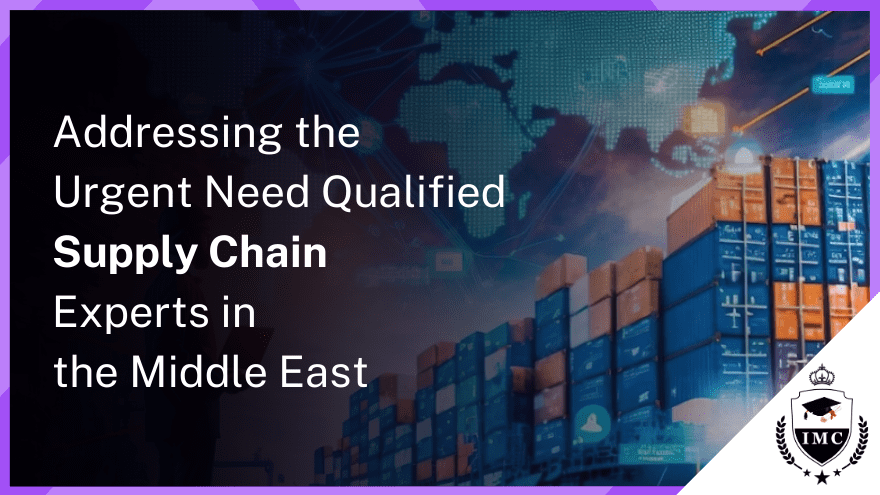The Middle East region is experiencing rapid growth in trade and infrastructure development. This has led to the expansion of the logistics sector, which is a crucial link between producers and consumers of goods and services. However, the complexity of modern global supply chains poses significant challenges for Middle East logistics companies. To improve efficiency, visibility and cost-effectiveness across multifaceted networks, there is an urgent need to leverage supply chain management (SCM) strategies and technologies.This rising demand has created a major skills gap, as most logistics providers lack qualified SCM experts within their organizations. Hiring specialists and upskilling employees through certification programs has become essential to build in-house capabilities. IMC Institute, a leading training provider in the region, offers comprehensive SCM courses aligned with global standards and best practices.
As regional and global trade volumes swell, expertise is required across key aspects of supply chain management:
- Logistics Network Design: Optimizing locations, transportation routes and modes based on cost and service parameters
- Inventory Management: Balancing supply and demand through strategies like safety stock optimization
- Warehouse Operations: Improving storage, order picking, dispatch and workforce planning
- Procurement Systems: Vendor integration, strategic sourcing and purchase order automation
- Lean Six Sigma: Reducing waste in processes through continuous improvement techniques
- Supply Chain Analytics: Leveraging data and technologies to enhance forecasting, reporting and decision making
Evolving Responsibilities of SCM Experts
- With supply chains becoming more sophisticated, the responsibilities of SCM experts have expanded exponentially:
- Leveraging network modeling tools and cost-service trade-off analysis to design optimal logistics networks and inventory positioning
- Implementing demand forecasting, planning and inventory management systems using statistical software and AI to cut stock-outs and obsolescence
- Conducting thorough analysis of logistics processes to identify and eliminate bottlenecks through Lean and Six Sigma principles
- Digitizing and automating sourcing, procurement, order management and documentation processes for efficiency
- Building integrated data analytics capabilities using ERP/WMS and business intelligence systems to get end-to-end supply chain visibility
- Keeping updated with innovations like IoT sensors, blockchain ledgers, machine learning and control tower solutions to manage supply chain disruptions and risks* Bridging the Widening Skills Gap
- With the bar for SCM capabilities rising, logistics providers are struggling to recruit, train and retain such multifaceted professionals. Partnering with specialized institutes is becoming critical to develop talent and gain a competitive edge.
- IMC Institute offers globally benchmarked certification programs in SCM, equipping professionals with up-to-date methodologies and technologies.
The comprehensive blended training methodology includes:
- Instructor-led sessions to build strong foundational knowledge
- Interactive online modules for flexibility and reinforcement
- Supply chain simulations to get hands-on experience
- Case studies, exercises and exam preparation for application of concepts
- Membership of a knowledge portal with regular content upgrades
- Certification to validate expertise as per international standards
Partnering with Domain Experts
To build these well-rounded capabilities, Middle East companies need to prioritize recruitment, training, and retention of SCM talent. Partnering with supply chain experts like IMC Institute allows access to globally benchmarked certification programs covering the latest methodologies and technologies.
The institute's comprehensive blended learning approach includes instructor-led training, interactive online modules, case studies, simulations and exam preparation. Participants get access to a knowledge portal with content updated continually. Certification helps validate expertise as per international standards.
With extensive real-world experience and connections, IMC serves as an invaluable knowledge and networking platform for supply chain professionals throughout the Middle East. Investing in such partnerships builds in-house capabilities and unlocks significant competitive advantage. In the fast-evolving regional trade landscape, SCM excellence is imperative for logistics companies to deliver superior performance. As demand grows exponentially, developing a team of certified experts through partners like IMC Institute is the key to long-term success.
By developing a team of certified SCM professionals, Middle East logistics companies can drive higher performance despite the industry's innate volatility. Partnering with IMC Institute provides access to the latest methodologies, tools and expert mentoring to build capabilities. As regional trade grows, demand for talent will continue to rise exponentially. With outstanding SCM expertise, leading players can offer superior customer service, tap new opportunities and boost profitability. Investing in people is key to long-term success in the competitive logistics arena.
Summary
The blog post discusses how the Middle East logistics sector is experiencing rapid growth in trade and infrastructure development, leading to expansion of the industry, but modern complex global supply chains pose significant challenges for Middle East firms who urgently need to leverage supply chain management (SCM) strategies and technologies however most lack qualified SCM experts. This talent gap has created high demand for specialists and upskilling employees through certification programs to build capabilities with courses aligned to global standards offered by institutes like IMC Institute, and as regional trade volumes swell, expertise is required across logistics network design, inventory management, warehouse operations, procurement systems, Lean Six Sigma, analytics. Supply chain professionals need expanded skills in modeling, forecasting, improvement, automation, visibility and emerging tech as chains evolve so partnering with institutes for globally benchmarked certification is crucial to equip with the latest methodologies through blended training and develop talent as demand continues rising exponentially to enable logistics leaders to improve performance, tap opportunities and deliver superior customer service.






